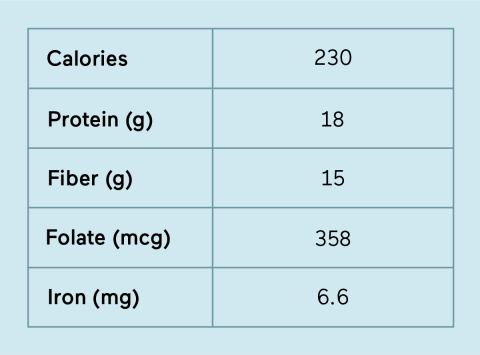Here, we break down everything you need to know about the nutrients, cooking methods, and health benefits of lentils. Prebiotics, which may be just as important for your gut as probiotics, are what our friendly gut bacteria feed on. This type of fiber, also found in foods like beans, garlic, onions, jicama, and more, promotes the proliferation and survival of this good bacteria and keeps your microbiome happy. Maintaining good gut health can positively affect everything from your bowel movements to appetite regulation to mood. Additionally, lentils can be a great meat replacement if you’re looking to reduce your intake of dietary cholesterol or saturated fat. Due to their high protein content and hearty texture, many vegetarian recipes lean on lentils. Try swapping the beef in Bolognese sauce with green lentils, or toss lentils into your favorite burger patties for a delicious and easy way to boost your intake of heart-healthy fiber. Neural tube disorders occur within the first 28 days of development, often before a woman even knows she is pregnant, so staying on top of folate consumption is crucial. Lentils are a delicious way to keep your folate levels in check without even thinking about it. Just 1 cup of lentils contains 90% (or 358 mcg1) of the RDI of folate. Of course, if you’re pregnant or trying to become pregnant, you’ll need to think about a lot more than just adding lentils to your diet. Consult with your doctor or a registered dietitian about how to best formulate your diet (a Mediterranean-style diet is often recommended but definitely not your only option) and what type of supplementation may be necessary. Getting enough dietary iron from food sources such as lentils can also help ensure strong hair, skin, and nails. In addition to helping prevent anemia, iron is necessary for healthy cell production and growth. In fact, signs of iron deficiency10 include brittle hair, pale skin, and weak nails. Lentils are also a great source of B vitamins, including vitamin B7, also known as biotin. Will Cole, D.C., IFMPC, explains, “Biotin is right there at the front line to fight the effects of aging with its role in fatty acid synthesis, which is crucial for healthy skin.” Biotin has even been nicknamed “vitamin H” due to its role in hair health. Important to note, though, is that the ability of lentils to help you achieve any of the above perks also depends on the composition of your overall diet. You want to focus on eating a combination of nutrient-rich, minimally processed whole foods, including a whole lot of plants—and lentils can be a very healthy addition to this type of diet. These side effects may not occur in everyone, though, so your best bet is to assess how you feel after eating lectin-containing foods like legumes. If you consistently feel sick, consider scaling back or eliminating lectins. If you feel OK, you’re probably in the clear. You can also drastically reduce the lectin content of legumes and grains by cooking them in a pressure cooker. Lentils are typically sold dry, but unlike dry beans, there’s no need to soak them before cooking—just a quick rinse will do. Either pop them in your pressure cooker or cover your lentils with water and simmer for about 20 minutes. Depending on the variety you are working with, you may want them still slightly chewy for green and black lentils or soft and soupy for red lentils. Consult the recipe to determine the best cook time to get the texture you are looking for. Try experimenting with the different types of lentils by tossing yellow lentil croutons on your next salad, whipping up some lentil and veggie soup, or making the traditional Indian red lentil dal. As mentioned above, you can also incorporate cooked lentils into your next beef burger or keep it completely plant-based and whip up a delicious veggie burger with a combo of lentils, chickpea flour, and sunflower seeds. There’s a whole lot you can make with this protein-rich legume! McDonough has developed & lead nutrition education programming in schools. She’s covered a wide range of topics as a health & nutrition reporter from the rise in the use of psychedelics for depression to the frustrating trend in shorter doctors’ appointments and the connection between diet and disease.




